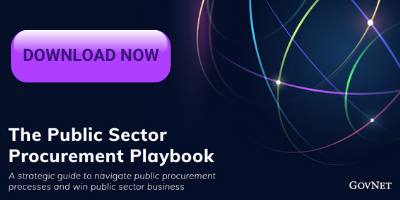Selling to the Public Sector: Everything You Need to Know
Around £300 billion is spent on public sector procurement each year - and that number is increasing. That’s a huge amount of money multiple businesses can capture throughout the year. However, as the saying goes, you have to be in it to win it, so how do you have a chance of winning public sector contracts?

From stationery to construction, healthcare to transport, competitive tendering supplies it all. And an emphasis on the ‘competitive’ nature of tendering is important. There’s a lot that goes into tendering for public contracts. So how do you win them?
We’ve broken it down into two sections; best practices on winning contracts and also maintaining them. Here’s everything you need to know about selling to the public sector.
Winning Public Sector Contracts
There’s a common misconception that public tenders always go to well-established companies, especially those bigger and more complex contracts, but this isn’t the case. There’s now an increasing focus within public procurement to open up contracts to SMEs and innovative new suppliers.
Contracts won’t always go to the market leaders who have been operating on the market for many years. There are many examples of exciting newcomers blasting on to the scene and using their competitive advantages to win contracts. It’s a real mixed bag, with increased levels of market disruption allowing SMEs to grab tenders from larger enterprises.
Contracts won’t always go to the market leaders who have been operating on the market for many years. There are many examples of exciting newcomers blasting on to the scene and using their competitive advantages to win contracts. It’s a real mixed bag, with increased levels of market disruption allowing SMEs to grab tenders from larger enterprises.
The trick is being able to stand out from the competition. The hallmark of a successful bid is showing the procurement agent - the organisation offering the contract - what you can offer and why you are better suited or capable of delivering better value than the rest.
With government spending representing 35% of the UK’s GDP in 2020, it’s a lucrative market for both enterprise businesses and SMEs. Here are our best practices for selling to the public sector:
Get to Grips With the Tendering Process
The entire tendering process has many steps, but can be whittled down to something that flows through these stages:
- Contract publishing: Where public sector organisations publish contracts for companies to bid on.
- Contract searching: The stage where companies use services such as Contracts Finder to find contracts applicable to their service offering.
- Pre-Qualification Questionnaire (PQQ): A pre-tender document filled out by potential bidders to filter the right choice for providing their services.
- Invitation to Tender (ITT) & response: This is the point where organisations which satisfy the early requirements are invited to ‘state their case’, showcasing why the contract should be awarded to them.
- Evaluation and scoring: Where tender responses are evaluated, scored and the contract is awarded based on the highest point scorer.
- Begin supplying the contract.
With in-depth knowledge about the tendering process stages and how to react and prepare for each of them, your business won't be at risk of losing out on key contracts.
We’ve explained the tendering process in more detail in this blog.
Be Aware of Changes to the Public Sector
Selling to the public sector isn’t the same as it was five or ten years ago. It arguably isn’t even the same as selling just one year ago and even more change is on the horizon with the introduction of the 2020 Green Paper, ‘Transforming Public Procurement’ which seeks to further streamline and simplify the process for buyers and suppliers alike.
In the post-pandemic world budgets are going to be tighter and public sector organisations must be even more laser-focused on ensuring tenders are carried out effectively to ensure the best deal for the UK taxpayer.
As such, this means you too have to be similarly granular in your approach to the detail throughout the tender process.It’s worth running over everything with a fine-toothed comb more than once or twice before finally placing your bid.
Understand the Context and Industry of the Bid
Suppliers who understand the markets and pain points of the procurement agents they’re bidding to will get much further than those who don’t. So, do your background research and make sure client knowledge is properly shared and acknowledged within your bid team.
For example, imagine you’re bidding on an NHS contract and QIPP (Quality, Innovation, Productivity and Prevention) and QOF (Quality and Outcomes Framework) come up in conversation, but you have no idea what they are. That’s not going to look like a supplier with the solutions needed, so make sure you do your homework.
Bide Your Time and Target Properly
Securing public contracts takes time, which doesn’t usually mesh well with standard sales rhetoric. Managers want to see sales every day. That’s not how the public sector operates.
The procurement process can often begin two years before money changes hands. The competitive nature of bidding and the system where bids are published online can lead less-experienced suppliers down a reactive rabbit hole. In contrast, the true professionals know procurement is a waiting game on both sides of the contract.
Similarly, the way tenders are published can lead to reactionary bidding and means inexperienced suppliers might end up targeting contracts that aren’t right for them. Alternatively, they target too many contracts at once in the hope that something will land, effectively spreading themselves too thin on multiple opportunities they don’t realise aren’t viable.
While suppliers need to show interest, network and make themselves heard in the market, they also need to be picky with what they bid on. Alongside that, they need to develop real insight into the sector and individual organisation that they hope to win business from. So when it comes time to search for contracts, they can weed through what isn’t a good target until something is found that is.
The bidding process is complex, but not impossible to navigate and benefit from. But what happens when you secure a contract? How do you work to maintain it so that you have more chance of both remaining successful and securing future contracts?
Maintaining Public Sector Contracts
More than ever, current issues and budgetary constraints are stretching government organisations. This means they’re under more pressure to deliver accurate services to those they serve. A direct implication of this is they’ll be increasingly stringent regarding what they want from suppliers.
While this applies during tendering, it also applies after the contract has begun. If a supplier isn’t providing on their side of the deal, there’ll be quicker withdrawals from any agreements made.
Suppliers need to provide these public sector organisations with more support than ever before. Here’s what you can do.
Never Miss a Deadline
It’s self-explanatory that businesses shouldn’t miss deadlines, but it’s advice worth reiterating.
Government agencies, especially now, are in no position to suffer delays. Any mishap will look bad on your reputation and affect how successful you are in retaining your current contract or securing a new one.
Be Proactive With Your Support
Support shouldn’t be offered as a simple contractual obligation, where you can tick off how many times you’ve provided help within a month and fill a quota. Public sector organisations don’t tick along like clockwork. They’re changeable entities and very susceptible to external influences. The support you provide needs to reflect that.
Work to offer support before they ask for it. You must anticipate their needs by evaluating contextual data, alongside any potential risks to their work and your contract. Solutions to problems need to be provided fast, effectively and where possible proactively.
Provide Data and Innovation
A supplier is only as good as the data they can provide. In our eventful, digitally-driven times, knowledge or rather data, truly is power. If you can supply real-time data concerning the ongoings and status of your service and the contract as a whole, your public sector buyers will be granted visibility that allows them to get their work done properly.
If there’s an issue with the supply chain, keep them informed. If you notice areas where they could improve, share the data that backs that finding. We all work best with a solid foundation in tangible facts, making sure you’re capitalising on this will stand you in good stead when applying for future contracts.
The same goes for technology. The public sector itself is going through various levels of digital transformation. You first need to mirror that and then use any innovative technology to supply digital capabilities that can’t be found elsewhere. This is also a key differentiator when bidding on contracts in the first place.
Selling to the public sector isn’t only about focusing on the small details of the bid itself, but it’s also about considering how you improve relationships and maintain a good service when you’ve won the contract.
The Public Procurement Playbook
Want to learn more about the public sector procurement process and win more public sector business? Download the Public Procurement Playbook.
Topics Covered Include:
- Public Procurement Trends & Stats
- How to Target and Find Contracts
- Improving Sales Potential & Outreach Tips
- Tips for Winning Contracts
- Managing the Bid Process
- Links to Other Useful Resources



